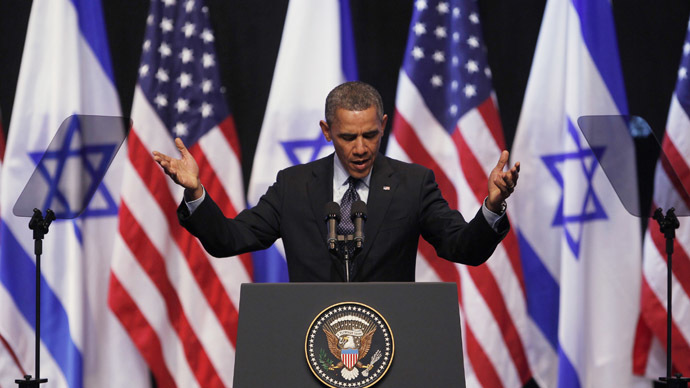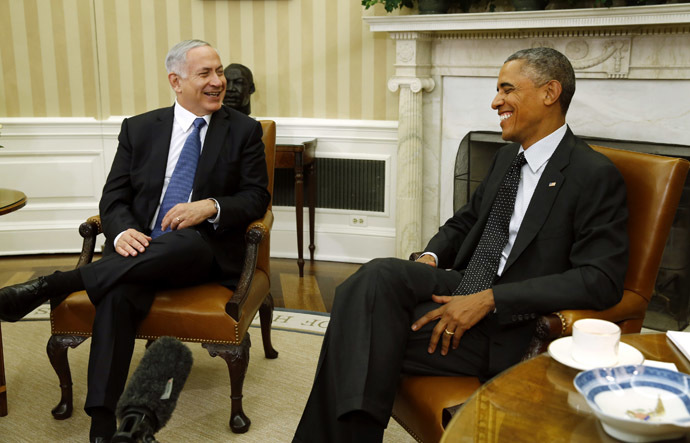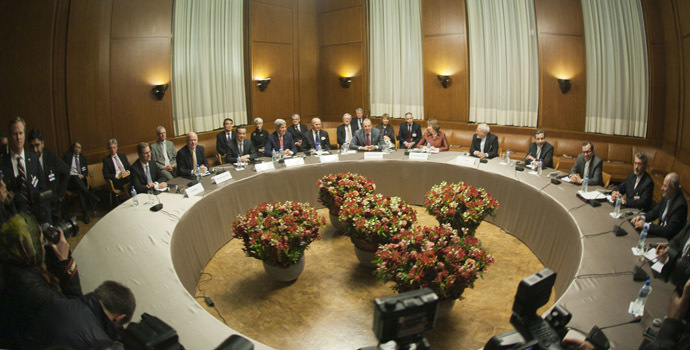‘US-Israel divide: Unlike Israel, Washington feels no threat from Iran’

The US sees no homeland security threat from Iran and is not willing to undertake military action against Tehran, especially after the trauma of Iraq and Afghanistan, Prof. Zachi Shalom, from the Institute for National Security Studies, Israel, told RT.
RT: There have been tough arguments between the US and Israel regarding the Iranian nuclear weapon issue for a long time. Why is that and how might that influence US- Israeli relations?
Zachi Shalom: It’s not something new. There is a kind of basic controversy between Israel and the US with regard to Iran. President Obama made it clear years ago that US policy towards Iran is prevention, that the US is determined to prevent Iran from becoming a nuclear state. But actually what is going on now and the agreement that is going to be signed between the P5+1 (the United States, Russia, China, United Kingdom, and France, plus Germany, and Iran), according to Netanyahu, is going to put Iran on a threshold of being a nuclear state, and that it will be able to make a breakthrough at any time that they want. Israel considers this to be mortally dangerous. As you know, we perceive the Iranian nuclear project as something that threatens our very existence. This is basically the disagreement between Israel and the US. It is not something cosmetic, it is not something marginal; it is a very basic disagreement between Israel and the US on how to deal with Iran.
READ MORE:What nuke? Things we learned from leaked spy cables that exposed Netanyahu's lie

RT:You said that this disagreement between two states is not something new. What do you mean by that?
ZS: …During the time that Israel has existed since 1948 until now, there have been many disagreements between Israel and the US including the period when [David] Ben-Gurion was Prime Minister. Historically when Israel became an independent state the US opposed it and threatened Israel not to declare independence. But Ben-Gurion decided not to listen to this instruction by the State Department; he decided to declare independence... So Netanyahu says that Israel and the US are very good allies, but even between the best friends there are sometimes disagreements. And sometimes we have questions over the interests.
READ MORE:Netanyahu warns America that Iran is an 'enemy', not a partner
In this case we have different views as we used to have in the history not only with regard to independence, but on many other cases Israel had disagreements with the US. In many cases Israel listened to the US and in many other cases it said: “No, we are an independent state and we will do what we think is suitable for us.” We think that now this is the case similar to the case that was in 1948. And now we have to say to the US that we totally disagree with the policy that they are carrying out towards Iran, to say that we have our own independent state and we have to undertake independent policy with regard to Iran.

RT:Is the US to blame for this division with Israel as it is willing to sign a nuclear deal with Iran regardless of Israel’s opposition?
ZS: That is not a question of blame; this is a question of interest. We are dealing with different states with regard to a question. The basic issue is that the US doesn’t feel threatened by Iran as Israel is because the US is far away from Iran and the fact that Iran is developing nuclear weapons is not threatening the homeland of the US. It is threatening the allies of the US like Israel, Saudi Arabia, Jordan, Egypt, and so on. But America as a state doesn’t feel an imminent and concrete threat [from] Iran.
That is why the Americans say that they are not ready to undertake military action against Iran, especially after they had this trauma in Iraq and Afghanistan. The American people do not want any more American troops to be fighting away from home unless there is a threat to the homeland of the US. And this is not the case. So we are not talking about blaming, it is not a question who is to be accused of this controversy. These are simply different interests between Israel and the US. Netanyahu is trying to put pressure on the American administration to take a pose that is suitable to the Israeli interest, [while] Obama is trying to do the other way around.
The statements, views and opinions expressed in this column are solely those of the author and do not necessarily represent those of RT.
The statements, views and opinions expressed in this column are solely those of the author and do not necessarily represent those of RT.












